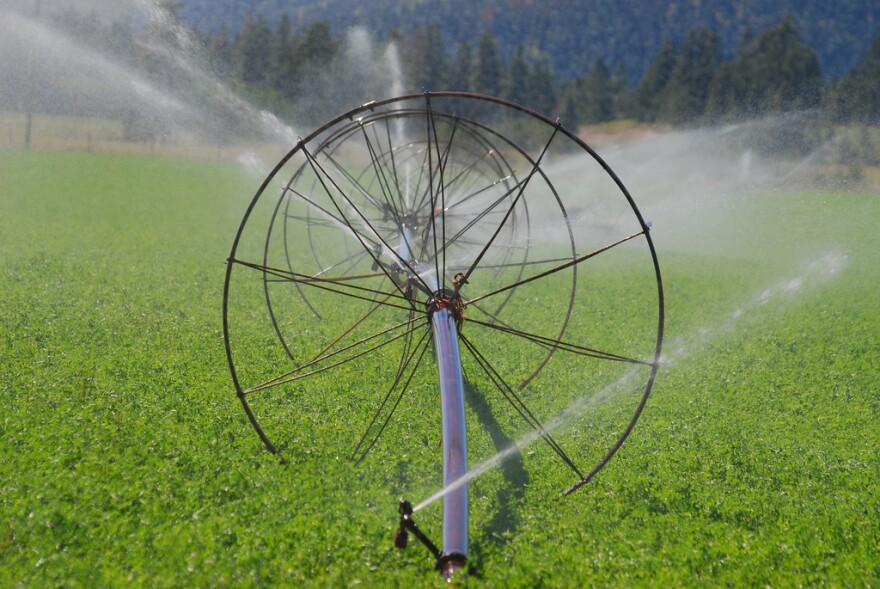Senator Jon Tester Thursday introduced the Flathead water compact in Congress. This is Montana’s final tribal water rights agreement, and has proven the most contentious.
"I believe these compacts provide tribes and local landowners and nearby communities with the certainty they need to increase economic development and avoid costly courtroom battles," Tester said.
Tester’s bill will ratify the water rights settlement negotiated between Montana and the Confederated Salish and Kootenai Tribes. It resolves water-related claims between the tribes and federal government, and will provide funding for projects like irrigation ditches, livestock fencing, and weed control. It would also improve drinking and wastewater systems. Tester calls the compact critical for local ranchers and farmers.
But it will cost nearly $3 billion. Tester is seeking $2.3 billion in federal funding in addition to $55 million from the state of Montana, but says the alternative is unacceptable.
"If you want to make a bunch of lawyers happy, don’t do this water compact. They’ll be standing in line because their wallets will be full. To do nothing is not a solution here. I’m telling you, water is our most important resource. Clean water is critical for our economy, whether you’re in agriculture or recreation or in business, doesn’t matter."
The Flathead water compact was the final tribal water compact to make its way through Montana’s state legislature, passing by a slim margin in both the state House and Senate in April of 2015. That’s largely because the CSKT claim water rights extending well outside the boundaries of their reservation, rights they say were guaranteed in treaties that date back to the mid-1850s.
Vernon Finley is the chairman for the Confederated Salish and Kootenai Tribes. He says Tester’s bill to move the compact into the Senate represents a negotiation between friends and neighbors.
"It’s a really good compromise. The tribes have put a lot on the table. We have compromised an awful lot considering that, according to the water laws, considering how much reach our water claims could be. So, coming to a resolution for all those claims for us is what’s really good for all Montanans."
Susan Lake, a third generation farmer from Ronan, echoed Finley.
"We are finding more and more support on the reservation for the compact as they become more educated."
Lake and her husband raise potatoes, grains and cattle. Early in the negotiations, they feared the compact would make farming no longer viable. But throughout the negotiation process, Lake says she was impressed by the bipartisan cooperation between the tribes and federal and state governments. She thinks the final compact promotes agriculture and ensures she can continue her family’s tradition.
"It protects our farm. It protects habitat for fisheries and wildlife, and that’s important to the tribe and that’s important to all of us living here."
But not everyone on the Flathead reservation agrees this is the right compromise.
"I believe it's very premature for Sen Tester to take this compact and present it to Congress."
Jerry Laskody is a member of the Flathead Joint Board of Control, the body that oversees irrigation districts on the reservation, and is an irrigator in the Flathead Valley.
He’s one of several irrigators who question the constitutionality of the state’s approval of the compact. He thinks Tester should have waited for the verdict of a lawsuit filed last April, which contends that a two-thirds majority of the state legislature, not the simple majority that passed the compact, was required.
"I don't know why he thinks that he can do that," says Laskody. "What if he gets it passed there and the court rules it illegal here? They’ve created a real bad position for themselves."
Tester says that waiting is not an option.
"We have to move forward. If we wait for it to be a perfect storm before we move back here, it’s never ever gonna happen, and I think it’s just critical we get started."
He pointed to other tribal water compacts, like the Blackfeet and Crow, as examples of complex agreements that took years to pass. The Democrat says the work now is to bring Montana’s two Republican congressmen on board. Both Senator Steve Daines and Representative Ryan Zinke have yet to support the Flathead water compact. Tester said he was uncertain if the compact would pass in the current Congress.


